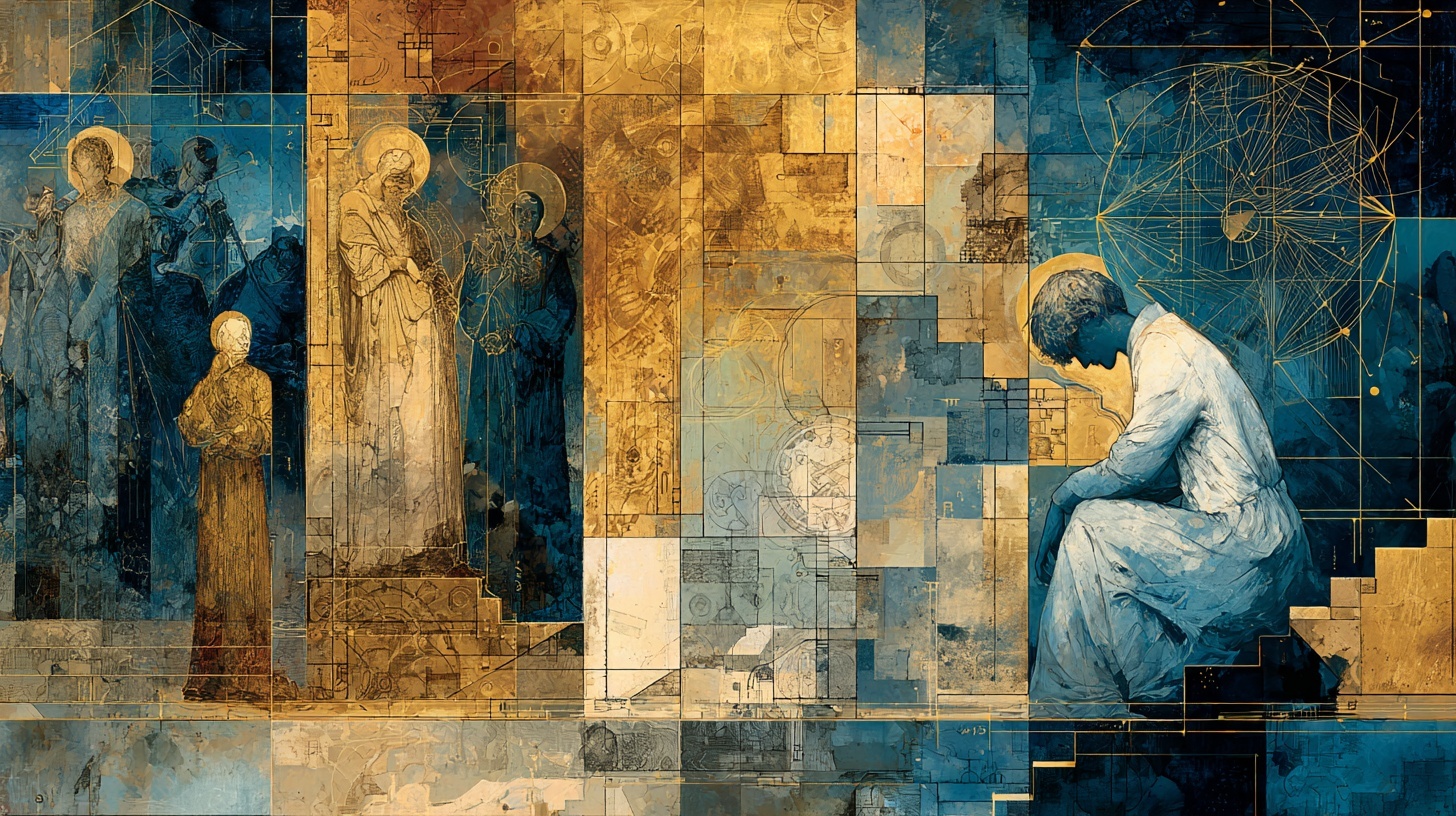"The outsourcing of salvation is an act of abandoning the soul's existential purpose"
— From the Perspective of Thought Engineering Spirituality
Introduction: Why "Outsourcing Salvation" Persists
Throughout Buddhist history, people have consistently been drawn to "salvation by others." While the Buddha emphasized "self-effort to stop the cycle of samsara," the development of Mahayana Buddhism gradually brought "afterlife" and "salvation by others" to the forefront.
This represents both an expression of compassion and a result of the masses' strong desire for "relief in the here and now." However, from a thought engineering perspective, this "outsourcing of salvation" has created critical structural flaws in humanity's spiritual evolution.
Why do people tend to delegate the work of deciphering their own soul's code to others? And what are the long-term implications of such delegation?
Historical Development: From Buddha to Modern Religion
Buddha's Origin Point: Debugging Samsara
Buddha's revolutionary insight lay in the question: "Why does samsara continue even after death?" While traditional religions assumed an "afterlife," Buddha focused on the karmic algorithm that persists beyond death itself.
From this perspective, salvation meant "analyzing karmic code and breaking the cycle of attachment"—an individual's subjective debugging process. The Noble Eightfold Path and Four Noble Truths were all frameworks for individuals to understand and correct their internal structures.
In thought engineering terms, Buddha was humanity's first "spiritual systems analyst," who viewed samsara as a "buggy karmic program" and presented its radical solution.
Mahayana Buddhism: Prioritizing Compassion and Comfort
Mahayana Buddhism arose from the noble aspiration to "save as many as possible." However, significant design changes occurred during its implementation process.
It created detailed narratives of heavens and hells after death, providing the masses with an accessible "structure of salvation." While this certainly brought psychological relief, it simultaneously relegated Buddha's original focus—"stopping the mechanism of samsara"—to the background.
As emphasis shifted to "afterlife guarantees" and "ancestral veneration," people's attention moved from "debugging one's own karma" to "securing safety through proper veneration." This became the seedbed for later "spiritual consumerism."
Esoteric Buddhism and Kukai: The Ideal of Integration and Implementation Challenges
Kukai's esoteric Buddhist philosophy was extremely sophisticated philosophically. His worldview of "unity with Dainichi Nyorai" and "this world itself as mandala" presented the possibility of "sokushin-jobutsu" (becoming Buddha in this lifetime), affirming even suffering and desire as manifestations of Buddha-nature.
However, in implementing this sublime philosophy, tendencies emerged toward dependence on proxy interventions through prayers and esoteric rituals. For the general populace, esoteric Buddhism was received as "special ceremonies by high priests," inadvertently reinforcing the structure of "spirituality left to experts."
Contrary to Kukai's own intentions, esoteric Buddhism began functioning as a "more sophisticated proxy salvation system."
Shinran: Ultimate Outsourcing Through Amida Salvation
Shinran's Jodo Shinshu pushed the logic of proxy salvation to its ultimate conclusion. His teachings of "akunin-shoki" (salvation especially for evil people) and "tariki-hongan" (other-power original vow) thoroughly acknowledged human limitations, ultimately entrusting everything to Amida Buddha.
While this provided great psychological relief for the masses, from a thought engineering perspective, this structure resembled a "comprehensive posthumous outsourcing contract." Buddha's core question—"Why does samsara continue?"—was completely bypassed, replaced by a faith mechanism of "salvation through belief."
This structure prepared the ground for later Japanese Buddhism's "danka system" and "funeral Buddhism."
Modern New Religions: The Completion of Business Model
In the modern era, the structure of "proxy salvation" transformed into overtly commercial systems. Logic such as "hell without belief," "large donations to save ancestors," and "special prayers to change destiny" emerged as historical consequences of Mahayana Buddhism's neglect of the fundamental problem of samsara.
Modern spiritual fraud and exploitative systems of new religions did not arise as sudden mutations. The psychological structure of "outsourcing salvation" accumulated historically, combining with information society characteristics to create sophisticated exploitation systems.
Structural Comparison: Anesthesia Model vs. Debugging Model
To understand contemporary spiritual problems, let us compare two fundamentally different approaches.
The Anesthesia Model: Temporary Symptom Relief
The Anesthesia Model alleviates suffering but does not provide fundamental cure. While prayers and proxy salvation offer temporary relief, the karmic structures generating suffering remain unchanged.
Characteristics of this model:
- Immediate effectiveness: Quick relief
- Dependency: Suffering returns when effects wear off
- Repetition: Continuously seeking the same treatment
- External dependency: Reinforces feelings of helplessness
- Monetization: Becomes continuous revenue source for providers
The Debugging Model: Root Cause Analysis and Correction
The Debugging Model involves individuals analyzing their own karmic code, identifying root causes of attachments and patterns, and making corrections. This approach cannot be outsourced and is the only method that preserves soul sovereignty.
Characteristics of this model:
- Time requirement: Takes time to see effects
- Self-empowerment: Develops capacity to solve problems independently
- Radical healing: Same problems unlikely to recur
- Internal authority: Generates genuine sense of life control
- Growth orientation: Processing capabilities themselves improve
Why Do People Choose Anesthesia?
The psychological reasons humans choose the anesthesia model are clear:
Avoidance of cognitive load: Analyzing one's own problems is difficult and painful. "Leaving it to experts" feels easier.
Craving for immediate results: In modern society's pace, the desire to "feel better right now" is natural.
Responsibility avoidance: "Having it done for you" carries less psychological burden than taking responsibility for self-change.
However, these are merely temporary benefits. Long-term, they rob opportunities for soul growth and distance individuals from true freedom.
Thought Engineering Proposal: Zero Trust Architecture for the Soul
What contemporary spiritual systems need is security architecture that protects soul sovereignty. Applying cybersecurity's "Zero Trust" concept to the spiritual realm requires the following principles:
Basic Design Principles
External Authority Verification Principle: Maintain verification attitude without blind faith, regardless of how authoritative an entity appears.
Principle of Least Privilege: Minimize scope delegated to others while making core judgments independently.
Continuous Monitoring: Regular self-assessment of spiritual state, monitoring for developing dependencies.
Defense in Depth: Avoid dependence on single spiritual authority; combine multiple perspectives and methods.
Concrete Implementation Tools
Spiritual IDE (Integrated Development Environment): Develop frameworks for visualizing and debugging one's own karmic code. This includes meditation, introspection, and structured self-analysis.
Karmic Mapping: Chart behavioral patterns, emotional flows, and attachment structures to identify root causes of problems.
Self-Validation: Establish criteria for objectively measuring spiritual growth without dependence on others' evaluations.
Peer Review: Build mutual learning communities of equals rather than following authority.
Social Implementation of the System
Implementing this new spiritual OS in society requires fundamental revision of educational systems.
Spiritual Literacy Education: Teaching verification methods for religious authorities, countermeasures against psychological manipulation, and development of internal authority within school curricula.
Legal Protection Systems: Establishing consumer protection laws for expensive spiritual services and collective litigation systems.
Certification Systems: Creating objective evaluation standards to distinguish between healthy spiritual guides and exploitative false gurus.
Historical Lessons: Why Return to Buddha's Origin Point
Reviewing Buddhist history reveals that spiritual exploitation problems intensify as we move further from Buddha's fundamental insight of "samsara debugging."
While Mahayana Buddhism's spirit of compassion is admirable, its implementation permitted "outsourcing of salvation." Esoteric Buddhism's integrative worldview is beautiful, but it created structures of expert dependency. Shinran's tariki-hongan contains deep insights, but ultimately has aspects that promote intellectual passivity.
Considering these historical developments, we need to modernly update Buddha's "self-debugging" spirit. This is the core of the "soul sovereignty" concept in thought engineering.
Elements of Contemporary Update
Introduction of Systems Thinking: Perspective for understanding individual problems within overall structural context.
Scientific Verification Methods: Methodologies for evaluating spiritual experiences and teachings in verifiable forms.
Integration with Technology: Self-analysis tools utilizing applications and AI.
Integration of Global Knowledge: Synthesizing insights not only from Buddhism but also psychology, cognitive science, and systems theory.
The Contemporary Challenge: Information Society and Spiritual Exploitation
Modern spiritual exploitation systems have evolved far beyond traditional religious fraud. They leverage information society characteristics to create unprecedented levels of sophisticated manipulation.
Digital Age Vulnerabilities
Information Overload: Overwhelming amounts of spiritual information make discernment increasingly difficult.
Echo Chamber Effects: Social media algorithms create isolated belief bubbles, reinforcing existing spiritual dependencies.
Authority Confusion: Difficulty distinguishing between genuine spiritual wisdom and manufactured authority in digital spaces.
Instant Gratification Culture: The speed of digital communication creates expectation for immediate spiritual solutions.
Structural Analysis of Modern Spiritual Exploitation
Contemporary spiritual exploitation systems operate through a sophisticated three-tier structure:
Authority Appropriation: Borrowing legitimacy from traditional spiritual authorities while offering modern "solutions."
Fear-Based Control: Using anxiety about death, meaning, and belonging to create psychological vulnerability.
Economic Dependency: Creating financial investment that makes leaving psychologically and economically difficult.
This structure specifically targets modern psychological vulnerabilities: community dissolution, identity crisis, scientific materialism fatigue, and the illusion of control through consumption.
Implementing Soul Sovereignty: Practical Framework
Moving from theory to practice requires concrete tools and methodologies for implementing soul sovereignty in daily life.
Personal Implementation Framework
Spiritual Security Audit: Regular assessment of spiritual relationships and practices to identify dependency risks.
- Who makes decisions about your spiritual life?
- What percentage of your spiritual practice requires external authority?
- How much financial investment is tied to spiritual promises?
- Can you maintain spiritual growth without external guidance?
Internal Authority Development: Systematic cultivation of independent spiritual discernment.
- Meditation practices that develop inner clarity
- Critical thinking applied to spiritual concepts
- Direct experience validation over belief acceptance
- Integration of multiple wisdom traditions without exclusive commitment
Karmic Code Analysis: Structured approach to understanding personal patterns and their origins.
- Behavioral pattern recognition and documentation
- Emotional trigger mapping and root cause analysis
- Attachment identification and gradual release protocols
- Continuous debugging and system optimization
Community-Level Implementation
Horizontal Learning Networks: Creating peer-based spiritual learning communities that avoid hierarchical authority structures.
Transparency Protocols: Open-source approaches to spiritual teaching that prevent manipulation through secrecy.
Mutual Accountability Systems: Peer review mechanisms that maintain high standards without authoritarian control.
The Global Implications: Towards a New Spiritual Paradigm
The principle of soul sovereignty extends beyond individual spiritual development to address global challenges in consciousness evolution.
Cross-Cultural Application
While this analysis focuses on Buddhist history, similar patterns of salvation outsourcing appear across religious traditions:
Christianity: From Jesus's direct spiritual teachings to institutional salvation through church hierarchy.
Islam: From Quranic emphasis on direct divine relationship to mediated authority through clerical systems.
Hinduism: From Upanishadic self-realization to guru-dependent spiritual paths.
The thought engineering approach to soul sovereignty offers a universal framework applicable across cultural and religious boundaries.
Societal Transformation Potential
Widespread adoption of soul sovereignty principles could catalyze broader social transformation:
Political Independence: Citizens less susceptible to authoritarian manipulation.
Economic Resilience: Reduced vulnerability to exploitation-based business models.
Cultural Evolution: Societies that support individual development while maintaining healthy community bonds.
Conclusion: The Path to Non-Outsourceable Spirituality
Soul salvation cannot be outsourced. This is not cold rejection, but a principle based on the fundamental dignity of human existence.
Delegated salvation resembles anesthesia—providing temporary relief but no fundamental solution. Rather, it robs individuals of growth opportunities, reinforces dependency relationships, and ultimately undermines soul sovereignty.
What Buddha aimed for 2500 years ago was "self-debugging." Rebooting this spirit in contemporary times provides the pathway to eliminating exploitative spiritual systems and realizing genuine spiritual evolution.
The mission of thought engineering is to redesign this ancient yet new path using modern technology and systems thinking. Rather than relying on others, we must become "spiritual developers" ourselves, deciphering our own karmic code, implementing updates, and deploying better versions of ourselves.
This journey is certainly not easy. But only there lies true freedom.
"Reclaiming soul sovereignty—that is the core requirement of humanity's next-generation spiritual OS."
Thought Engineering Institute
Saniwa · Ray Kissyou

